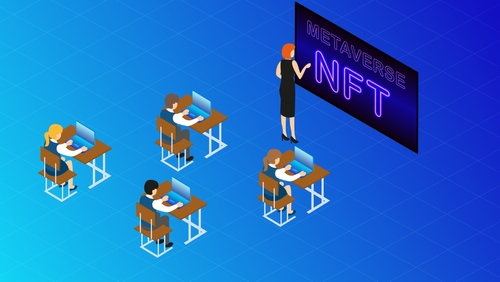
Nas Academy is going deeper into the web3 ecosystem thanks to its partnership with Invisible College.
Creator tech platform Nas Academy announced on Tuesday, August 9th, that it has partnered with Invisible College to launch a cryptocurrency academy for web3.
According to the press release shared with Coinjournal, the partnership will lead to the launch of the world’s first bundle of courses that can be unlocked with an NFT collection.
The team revealed that more than $2,000 worth of courses would be made available initially, covering topics like NFT investing, Community Building, Video Editing, and Crypto fundamentals.
The press release added that starting on September 1st, Invisible College members who hold a Decentralien NFT will be able to unlock more than 18 web3 and creator courses on Nas Academy for free.
Invisible College is a school focused on helping people learn, invest, and build in web3.
The library includes courses from some of the world’s top creators and investors, including Zeneca, Nuseir Yassin, and Ben Yu.
While commenting on this latest development, Nas Academy CEO Nuseir Yassin said;
“Web3 is more than just a compelling topic for courses. We believe NFTs can reinvent the way students consume online education and allow people to own a piece of the internet. That’s why we wanted to partner with a visionary community in the form of Invisible College. We are excited to build together to help educate and bring the next wave of users into web3.”
The Nas Academy said this catalog of courses would empower students to build, influence, and invest in the future of the internet.
Invisible College Co-Founder Nick deWilde commented that;
“Lately, there’s been lots of debate about web3 use cases. The way we see it, combining a catalog of high-quality courses with an NFT collection is a fundamentally new way to empower students to own their education. And there’s no way we could have pulled it off without web3 technology.
We also needed a forward-thinking partner who was willing to innovate with us. Fortunately, the Nas Academy team are just the type of crazy dreamers who could help us expand our vision and make it a reality.
Finally, we’d like to thank all of the creators who have joined this historic collaboration. They’ve produced some incredible classes that we’re excited to share with a brand new audience.”
Invisible College said it would also be working with Nas Academy to onboard leading web3 instructors to teach courses on the platform, with the goal of becoming the largest web3 learning library on the internet.
Nas Academy is a technology platform that empowers creators to build communities through education.
The post Nas Academy partners with Invisible College to launch a crypto academy for web3 appeared first on CoinJournal.




